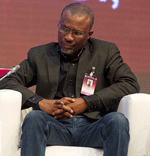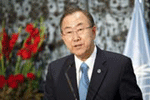Published on Mon, 2013-09-30 19:19
Third World Network-Africa (TWN Africa) has punched holes into the revised Ghana Investments Promotion Centre (GIPC) Bill, noting that there has been little change to the provisions. According to the non-governmental organization, the changes in the provisions did not offer any relief for domestic producers. |
Published on Thu, 2013-09-26 01:01
In a new comment the the Civil Society Reflection Group on Global Development Perspectives states that the SG’s report fails to address the core structural and macro-economic issues that shape the ability to implement and finance people-centered, ecologically sound policies and programs at all levels. The UN Secretary-General’s (SG) report “A life in dignity for all” (A/68/202) calls for a “new post- 2015 era […] a new vision and a responsive framework […] a universal agenda that requires profound economic transformations and a new global partnership.” Unfortunately that new vision and the new partnerships proposed by the SG derail our ability to meet the challenges we face today. |
Published on Wed, 2013-09-25 23:05
While the Arab region’s countries and peoples are busy with their crisis conditions as a result of the difficulties and challenges facing the democratic transition process, preparations continue for the UN General Assembly’s 68th summit in late September. The summit is expected to consider the political situation around the world, and the situation of the Arab region will be one of the most important cases on the agenda, particularly the crisis in Syria that has taken on international dimensions. On the one hand, the scope of blatant interference in the internal conflict by regional and international powers widened, and the Syrian Revolution turned into a regional arena of conflict with international dimensions due, on the other hand, to the use of internationally-banned weapons of mass destruction in many stages of the conflict (their recent use in residential areas led to the deaths of hundreds of innocent citizens). |
Published on Wed, 2013-09-25 00:00
The UN Secretary-General’s (SG) report “A life in dignity for all” (A/68/202) calls for a “new post-2015 era […] a new vision and a responsive framework […] a universal agenda that requires profound economic transformations and a new global partnership.” Unfortunately that new vision and the new partnerships proposed by the SG derails our ability to meet the challenges we meet today. |
Published on Tue, 2013-09-24 00:00
From 16 till 18 September UN Women convened an expert meeting on the post-2015 development agenda and gender equality in Kenya. Approximately 40 experts with representation from diverse backgrounds contributed to this meeting. A wide range of challenges that the world is facing were discussed, varying from specific topics such as women’s role in sustainable livelihoods, women’s health and violence against women, to more general topics such as poverty, education, economic development, food and natural resources. The expert meeting said to be committed to the attainment of the Millennium Development Goals and the acceleration of their implementation and to the prior commitments in the Beijing Platform of Action. |
SUSCRIBE TO OUR NEWSLETTER







